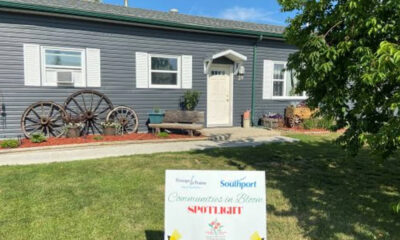Health
Manitoba Introduces Doctor Support to Enhance Health Links Service

The Manitoba government has announced the addition of a new doctor to its Health Links–Info Santé program to help streamline patient care and reduce unnecessary emergency room visits. This initiative aims to enhance the efficiency of the nurse-managed bilingual telephone service, which provides health assessments, triage, and advice to residents.
Health Minister Uzoma Asagwara confirmed that the doctor became available to assist callers from 8 a.m. to 6 p.m. earlier this month. The service, which averages approximately 400 calls per day, will benefit from this professional oversight, particularly in directing patients to appropriate health care resources. In the first ten days following the doctor’s introduction, 160 patients were transferred to speak with the physician, with only 10 of those needing to be referred to an emergency room.
The addition of a second clinician is anticipated by late December 2023, who will work overnight hours to ensure continued support. In the long term, the program plans to incorporate nurse practitioners to further bolster its capabilities. Asagwara highlighted the common frustration among Manitobans who have experienced long waits in emergency rooms after calling Health Links, stating that adding doctors to the service can help alleviate pressure on the broader health care system.
The Health Links–Info Santé program plays a crucial role in assessing patient needs. Depending on the situation, nurses may advise individuals to consult their family physician, visit a walk-in clinic, or go to an emergency room or urgent care centre. This structured response aims to optimize the use of emergency services.
In a related development, the Manitoba government has launched a new $5,000 bursary program for students training to become emergency medical responders. Announced on November 1, 2023, this initiative is designed to attract students to careers in rural Manitoba, where they will be required to enter into a one-year return-of-service agreement after being hired.
Minister Asagwara emphasized the importance of providing financial support to make emergency medical training more accessible. He noted that the program will place trainees in rural municipalities, allowing them to gain hands-on experience with real-world emergency calls. By the fall of 2026, it is expected that around 50 to 60 emergency medical responder students will graduate and become eligible for hiring into provincial emergency medical services.
Despite these efforts, concerns remain regarding the training and capabilities of emergency medical responders. Jason Linklater, president of the Manitoba Association of Health Care Professionals, pointed out that while emergency medical responders are valuable, their limited scope of practice does not allow them to provide the same level of care as fully trained paramedics. Time-sensitive emergencies, such as cardiac arrests or severe trauma, often require simultaneous interventions from two trained paramedics, he explained.
The government has made commitments to improve paramedic services, with the New Democratic Party (NDP) having added 18 of the 200 paramedics promised since taking office in 2023. Ensuring adequate training and resources for emergency medical responders remains a priority in the ongoing efforts to enhance the health care system in Manitoba.
-

 Politics3 weeks ago
Politics3 weeks agoSecwepemc First Nation Seeks Aboriginal Title Over Kamloops Area
-

 World4 months ago
World4 months agoScientists Unearth Ancient Antarctic Ice to Unlock Climate Secrets
-

 Entertainment5 months ago
Entertainment5 months agoTrump and McCormick to Announce $70 Billion Energy Investments
-

 Lifestyle4 months ago
Lifestyle4 months agoTransLink Launches Food Truck Program to Boost Revenue in Vancouver
-

 Science5 months ago
Science5 months agoFour Astronauts Return to Earth After International Space Station Mission
-

 Technology3 months ago
Technology3 months agoApple Notes Enhances Functionality with Markdown Support in macOS 26
-

 Top Stories2 months ago
Top Stories2 months agoUrgent Update: Fatal Crash on Highway 99 Claims Life of Pitt Meadows Man
-

 Lifestyle2 months ago
Lifestyle2 months agoManitoba’s Burger Champion Shines Again Amid Dining Innovations
-

 Politics4 months ago
Politics4 months agoUkrainian Tennis Star Elina Svitolina Faces Death Threats Online
-

 Sports5 months ago
Sports5 months agoSearch Underway for Missing Hunter Amid Hokkaido Bear Emergency
-

 Politics4 months ago
Politics4 months agoCarney Engages First Nations Leaders at Development Law Summit
-

 Technology5 months ago
Technology5 months agoFrosthaven Launches Early Access on July 31, 2025


















